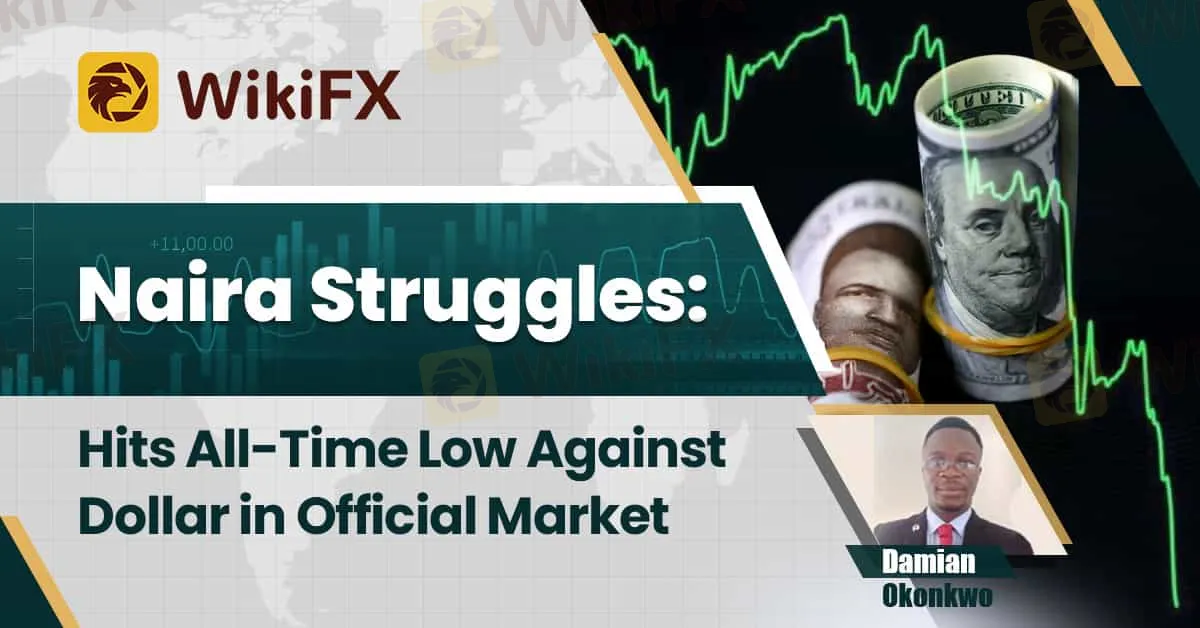简体中文
繁體中文
English
Pусский
日本語
ภาษาไทย
Tiếng Việt
Bahasa Indonesia
Español
हिन्दी
Filippiiniläinen
Français
Deutsch
Português
Türkçe
한국어
العربية
Naira Struggles: Hits All-Time Low Against Dollar in Official Market
Abstract:The Naira's struggles are a complex issue with no easy solutions.

By: Damian Okonkwo

The Nigerian Naira has faced serious challenges since 2024, reaching record lows against the US Dollar in both the official and parallel foreign on February 20th, 2024; to trade at the lowest rate ever at N1,620.96 per $1 on the FMDQ Exchange, which is the official platform for official foreign exchange trading.
The situation seen in the parallel market, a less regulated space, is even more concerning. Here, the Naira crossed the N1,750 per $1 mark, to nearly N2000 per $ same day, further highlighting the pressure on the currency.
Factors Contributing to the Decline:
There are many factors that may have contributed to the current devaluation of the Naira. These includes:
A. Dollar scarcity: The primary driver of the Naira's depreciation is the limited availability of US Dollars in the Nigerian market. This scarcity could be attributed to:
● Lower oil revenue: Oil exports are a major source of foreign exchange for Nigeria. However, a decline in global oil prices and production issues have restricted this income.
● Increased demand for dollars: The demand for dollars has risen due to factors like:
● Import dependency: Nigeria relies heavily on imports, requiring foreign currency for purchases.
● Capital flight: Investors and businesses are shifting their funds outside Nigeria due to economic uncertainties, further reducing dollar availability.
B. Central Bank of Nigeria (CBN) policies: The CBN's attempts to manage the situation through:
● Multiple exchange rate system: Maintaining different exchange rates for different transactions has created complexities and uncertainties in the market.
● Currency controls: Restricting access to foreign exchange for certain individuals and businesses has impacted accessibility and transparency.
The Impact on the Economy
The Naira's depreciation has widespread negative consequences:
a) Import costs: Higher exchange rates make it more expensive to import goods, leading to inflation, impacting the cost of living for Nigerians.
b) Investment climate: Uncertainty in the foreign exchange market discourages foreign investment, hindering economic growth.
c) Savings and purchasing power: The declining value of the Naira weakens the purchasing power of individuals and businesses holding Naira, impacting their savings and investments.
The Response:
The CBN has taken steps to address the situation, including:
● Injecting dollars into the official market: The CBN has intervened to increase dollar availability, but the impact of these interventions remains limited.
● Clearing foreign exchange backlogs: Addressing specific forex demands, like backlogs owed to airlines, aims to alleviate pressure in certain sectors.
Possible ways out:
Observing the current situation of the country, experts urge the government to:
● Focus on diversifying the economy: Reducing reliance on oil exports and fostering other sectors can lessen dependence on foreign currency.
● Promote transparency and predictability in foreign exchange policies: Clear and consistent policies can build trust and encourage investment.
Conclusion
The Naira's struggles are a complex issue with no easy solutions. Addressing the underlying factors that contribute to the dollar scarcity and implementing comprehensive economic reforms are crucial for stabilising the exchange rate and fostering sustainable economic growth in Nigeria.

Disclaimer:
The views in this article only represent the author's personal views, and do not constitute investment advice on this platform. This platform does not guarantee the accuracy, completeness and timeliness of the information in the article, and will not be liable for any loss caused by the use of or reliance on the information in the article.
Read more

Dark Side of AETOS: They Don’t Want You to Know
AETOS is an Australia-based broker. All over the internet, you will find positive reviews about this broker, but no one is talking about the risks involved with AETOS. However, we have exposed the hidden risks associated with AETOS

Contemplating Investments in Quotex? Abandon Your Plan Before You Lose All Your Funds
Have you received calls from Quotex executives claiming to offer you returns of over 50% per month? Do you face both deposit and withdrawal issues at this company? Or have you faced a complete scam trading with this forex broker? You're not alone. Here is the exposure story.

15 Brokers FCA Says "Are Operating Illegally" Beware!
If a reputable regulator issues a warning about unlicensed brokers, it's important to take it seriously — whether you're a trader or an investor. Here is a list you can check out- be cautious and avoid getting involved with these scam brokers.

Scam Alert: Revealing Top Four Forex Scam Tactics Employed to Dupe Investors
Gaining and losing on forex trades is normal, but not scams that siphon out millions in no time! In this article, we will reveal forex scam tactics. Read on!
WikiFX Broker
Latest News
PrimeXBT Launches MT5 PRO Account for Active Traders
eToro Expands into Singapore with MAS CMS Licence
Renault shares plunge 16% after French carmaker lowers guidance, appoints new interim CEO
Darwinex Launches INDX: A Revolutionary Investment Strategy for Traders
Top Forex Trading Scams to Watch Out for in 2025
Real Risk Factors with Admiral Markets ! Explained
5 Reasons to Know Why INFINOX Is a Standout Broker?
5 things to know before the stock market opens Wednesday
Trump's big beautiful bill' caps student loans. Here's what it means for borrowers
Weekly mortgage demand plummets 10%, as rates and economic concerns rise
Currency Calculator


